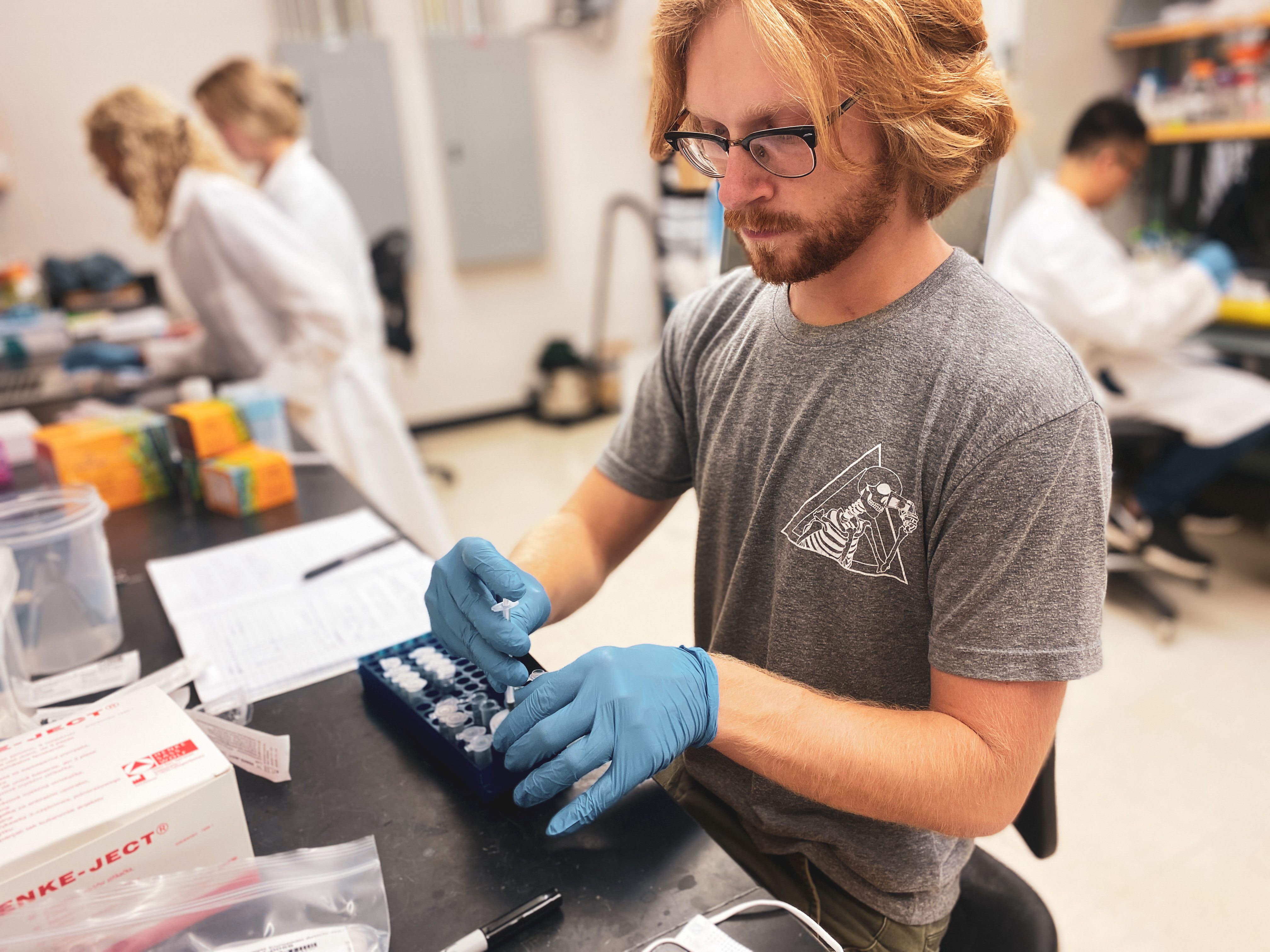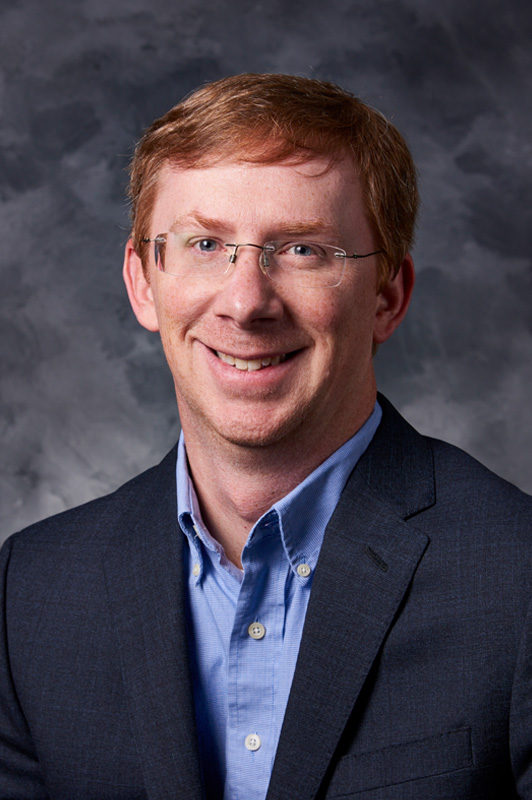REU: Bioprocessing for Conversion of Waste into Products of Value
The Research Experience for Undergraduates (REU) program supports active research participation by undergraduate students in areas of research funded by the National Science Foundation. The objective of this project is to integrate undergraduate students in team-based research projects focused on converting biological wastes into products of value. Solving this problem is an interdisciplinary challenge and we will engage teams of REU fellows and collaborating faculty mentors to work toward a sustainable solution.
Program Dates: May 10, 2026 - July 18, 2026

This REU project site is a short, fast-paced summer research experience for 9 undergraduate students. Students will gain research experience while developing the confidence to communicate scientific results and develop the skills to effectively work as part of a team. Through this interdisciplinary project, REU students will engage in rich learning opportunities across 5 major academic fields - Biosystems Engineering, Chemical Engineering, Forestry, Fisheries, and Horticulture.
This REU site also promotes the REU fellows’ professional development through diverse learning activities and hands-on workshops focused on teamwork best practices, research practice, scientific writing, literature evaluation, and field trips to project-relevant sites. This is an opportunity to experience the scientific research process, make connections that could help further your career, and work directly alongside some of the most intelligent minds in their field.
- Conversion of biomass into resins and composites
-
Team 1: Conversion of bio-oil into polyurethane resins and composites Maria Auad (leader), Brian Via, Hossein Jahromi
Polymer resins play a critical role in the materials industry due to their high versatility concerning physical, thermal, and mechanical properties. Selection of the proper polymer system coupled with precise dialing of the molecular weight, cure temperature, and cure time is essential to ensure the materials are designed for end use and have suitable modulus, strength, durability, and chemical resistance to various solvents. One of the major driving factors for this market is the growing demand for composite materials since these resins are widely used as matrix components. Transitioning from these petroleum systems to a sustainable bio-based source will be necessary for future industries. Important biopolymer candidates for sustainable replacementof petroleum products include cellulose, lignin, and bio-oils.
During this project REU students will explore new synthetic pathways to design and synthesize high-performance bio-resins using lingo-cellulosic bio-oil derivatives with desired and controlled macromolecular architecture to produce resins and wood composites.
-
- Aquaponics and bioponics for sustainable vegetable production
-
Team 2: Aquaponics and bioponics for sustainable conversion of fish waste into fresh produce Brendan Higgins (leader), Qichen Wang and Daniel Wells
Aquaponics, which combines aquaculture and hydroponics, is an emerging technology that seeks to maximize nutrient- and water-use efficiencies and mitigate negative environmental impacts of traditional agriculture by growing fish and plants in the same facility, using shared water. Aquaponics is scalable and has potential to address both food insecurity and local food needs in urbanized areas because of high production potential. Similar to aquaponics, bioponics uses general waste streams (anaerobic digestate, wastewater) to grow hydroponic plants. Although these systems effectively repurpose environmentally-harmful wastewater for food production, they suffer from shortcomings that have hindered their adoption. Cultivation of low-value fish (e.g. tilapia) and vegetable yields that are lower than hydroponic systems hurt the economics of aquaponics and bioponics systems.
Our interdisciplinary team in Horticulture and Biosystems engineering aims to engage REU students in overcoming these challenges by engaging in the following research objectives:1) Test the ability of a combined probiotic and prebiotic cocktail of algae and bacteria to enhance plant and algae growth in aquaculture wastewater. 2) Test the ability of purple bacteria to pretreat anaerobically digested fish waste sludge for bioponic plant growth. 3) Test the effectiveness of split-root hydroponics to overcome salinity imbalances in aquaponics/bioponics media. All three of these efforts address the productivity gap in aquaponics and bioponics systems.
-
- Upcycling of poultry waste biomass and sensor development
-
Team 3: Valorization of poultry waste solids and sensor development for assessing odorous molecules Saravanan Shanmugam (leader), Iris Vega Erramuspe.
The Southeastern U.S. is the largest producer of poultry products in the US and hence many processing facilities are concentrated in this region. Alabama currently houses 34 poultry processing facilities generating large quantities of solid waste from processing operations. Owing to the high-water content of these solids and their biodegradable nature, these materials quickly become rancid which reduces their value for the rendering industry. Many renderers within this region are unwilling to process this waste stream. Currently, these wastes are poorly managed and land-applied, creating significant nutrient loss along with the creation of odors. Sensors to accurately quantify the sulfur-containing compounds generated by decomposition of the solid waste mentioned above are either too expensive or inaccurate. The sensors performance can be sensitive to humidity and particulate matter. Hence, there is a need for the development of robust cost-efficient sensors to accurately quantify this type of volatile organic compound (VOCs). Additionally, the poultry solid wastes are rich in nutrients such as proteins (20-30%), fats (50-65%) and soluble amino acids which can be efficiently upcycled into value-added products. Theproposed work aims to upcycle the nutrients present in this waste stream for nutritional yeast cultivation using Yarrowia lipolytica.
Our research team from Biosystems engineering aims to engage two REU students in solving these issues by engaging them in the following research objectives: 1) Understand the inhibitory effects of polymers and inorganic flocculants during conversion of poultry fat using nutritional yeast fermentation and, 2) Develop sensors to accurately quantify the sulfur-containing volatile organic compounds using metal-oxide based gas sensors
-
PROJECT: Conversion of bio-oil into polyurethane resins and composites
Maria Auad (lead)
Research Area: Polymer nanocomposites, polymers for structural/medical application
Brian Via
Research Area: Bio-based adhesives
Hossein Jahromi
Research Area: Production of bio-oils for adhesives and lubricants
PROJECT: Aquaponics and bioponics for sustainable conversion of fish waste into fresh produce
Brendan Higgins (Lead)
Research Area: Algal-bacterial interaction for wastewater treatment and resource recovery
Daniel Wells
Research Area: Aquaponics and hydroponics plant production
Qichen Wang
Research Area: Algal-bacterial interaction for wastewater treatment and resource recovery
PROJECT: Valorization of poultry waste solids and sensor development for assessing odorous molecules
Sarvanan Shanmugam
Research Area: Upcycling of Nutrients from Poultry Waste Streams
Iris Erramuspe
Research Area: Developing bio-based sensors to measure impacts of poultry wastes
Jasmeet Lamba
Research Area: Irrigation of crops using treated poultry processing wastewater
This is a 10-week intensive research experience coupled with professional development activities. Fellows will meet weekly with their mentors and biweekly with their interdisciplinary teams to facilitate communication. These activities align with the two overarching professional development themes of this REU site: communication of scientific results and effective team practices. These activities also facilitate the growth of independent researchers.
Each REU student will receive:
- A generous stipend of $700/week
- On-campus housing
- A living allowance to cover food and other living expenses
- Travel reimbursement of up to $500
Program Dates: May 2026 - July 2026
It is best to complete the application in one sitting. Some of the questions may take you some time to answer so we recommend preparing some responses in advance. Be ready to describe:
- Any past research experiences you have participated in
- Your past work experiences
- The most challenging work/ research/ volunteer experience you have ever faced
- What attracts you to conducting research
- Your career plans or goals
- How this REU experience enables your career plans or goals
Application Deadline: February 2, 2026

Jon Davis
Senior Lecturer
Undergraduate Program Coordinator
Biosystems Engineering
211 Corley Building
M.S. Civil Engineering, Auburn University
B.S. Forest Engineering, Auburn University
Ph.D. Science Education, Auburn University
Hello and welcome to this REU experience! My name is Dr. Jonathan Davis and I am the Site Director for this REU sponsored by the National Science Foundation. We have an exciting lineup of faculty participants, projects, and participant activities planned for this upcoming summer. We are glad you are interested in this REU site. Click and scroll the menus below to learn more about our faculty researchers, descriptions of the projects, and how to apply to be a REU fellow with us.

